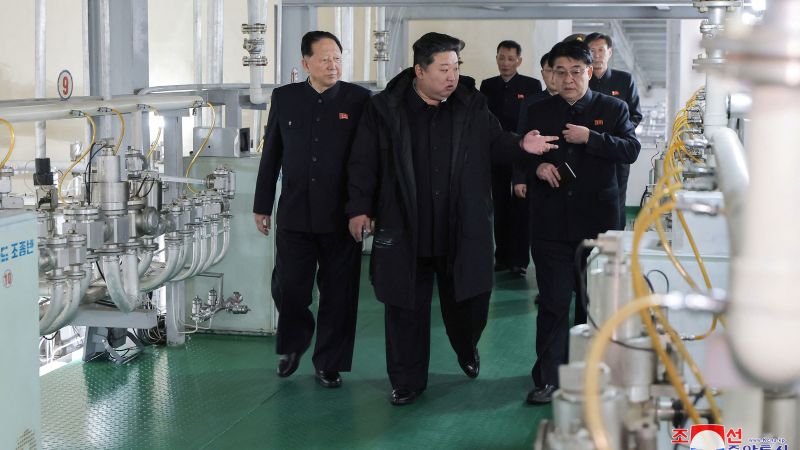As American B-2 bombers streaked over Iran, targeting facilities tied to Tehran’s nuclear ambitions, policymakers and analysts in East Asia were already grappling with a critical question: What signal does this send to North Korea, a country whose nuclear arsenal is far more advanced than Iran’s?
Experts warnWashington’s military actionsmay harden Pyongyang’s resolve to accelerate its weapons program and deepen cooperation with Russia, as well as reinforcing its leader Kim Jong Un’s belief that nuclear arms are the ultimate deterrent against US-enforced regime change.
Despite yearslong efforts to persuade North Korea to abandon its nuclear weapons program, the Kim regime is thought to possess multiple nuclear weapons, as well as missiles that can potentially reach the United States – meaning any potential military strike on the Korean Peninsula would carry vastly higher risks.
“President Trump’s strike on Iran’s nuclear facilities will undoubtedly further reinforce the legitimacy of North Korea’s longstanding policy of regime survival and nuclear weapons development,” said Lim Eul-chul, a professor of North Korean studies at South Korea’s Kyungnam University.
“North Korea perceives the recent US airstrike as a preemptive military threat and will likely accelerate efforts to enhance its own capability for preemptive nuclear missile attacks,” said Lim.
That acceleration, analysts caution, could come through Russian assistance, thanks to a blossoming military relationship the two neighbors have struck up in the wake of Moscow’s invasion of Ukraine.
Since its formal establishment in 2024, North Korea’s strategic partnership with Russia has become a vital economic and military lifeline for Pyongyang amid ongoing Western sanctions.
“Based on the strategic alliance between North Korea and Russia, Pyongyang is likely to move toward joint weapons development, combined military exercises, technology transfers, and greater mutual dependence in both economic and military terms,” Lim said.
North Korea has sent more than 14,000 soldiers and millions of munitions, including missiles and rockets, to aid in Russia’s invasion, accordingto a report by the Multilateral Sanctions Monitoring Team (MSMT), an initiative made up of 11 United Nations members.
In return, Russia has provided North Korea with various valuable pieces of weaponry and technology, including air defense equipment, anti-aircraft missiles, electronic warfare systems and refined oil.
These actions “allow North Korea to fund its military programs and further develop its ballistic missiles programs, which are themselves prohibited under multiple (UN Security Council resolutions), and gain first-hand experience in modern warfare,” the report found.
In Kim’s eyes, recent US military actions in Iran follow a troubling logic: countries without nuclear weapons, from Iraq and Libya to Iran, are vulnerable to US-led intervention, said Victor Cha, Korea chair at the Center for Strategic and International Studies. North Korea, having already tested six nuclear devices and developed long-range missiles, sees its arsenal as non-negotiable.
According to Cha, Washington’s airstrikes against Tehran’s nuclear assets will likely leave a lasting impression on the Kim regime. “The strikes on Iran will only reaffirm two things for North Korea, neither of which play well for US policy,” he said.
“One: the US does not have a use-of-force option for North Korea’s nuclear program like they had in Israel for Iran. Two: the strike only reaffirms in Kim Jong Un’s mind his conviction to pursue and maintain a nuclear arsenal.”
And the contrast between Iran and North Korea is stark, particularly in terms of nuclear capabilities.
“Pyongyang’s nuclear program is much more advanced, with weapons possibly ready to launch on multiple delivery systems, including ICBMs,” said Leif-Eric Easley, an international security professor at Ewha Womans University in Seoul, referencing intercontinental ballistic missiles which can travel around the globe, far further than any missiles Iran possesses.
“The Kim regime can threaten the US homeland, and Seoul is within range of many North Korean weapons of various types,” he added.
Iran, by contrast, has not yet developed a deliverable nuclear weapon and its uranium enrichment had remained short of the threshold for weaponization, according to the International Atomic Energy Agency’s latest assessment.
It had also pursued years of diplomacy with the US and Western powers over its nuclear program, diplomacy that was supposedly still in play when Trump ordered B-2 stealth aircraft to drop “bunker busting” bombs on Iran’s nuclear facilities.
North Korea is believed to possess between 40 and 50 warheads, along with the means to deliver them across the region and potentially to the US mainland.
“An attack on North Korea could provoke the risk of full-scale nuclear war,” Lim of Kyungnam University warned.
He added that under the US-South Korea alliance treaty, US military action against North Korea would also require prior consultation with the South Korean government, a step that carries political and legal implications.
There are also external powers to consider. Unlike Iran, North Korea has a formal mutual defense treaty with Russia, “which allows Russia to automatically intervene in the event of an attack,” Lim underscored.
This matrix of deterrents – nuclear capability, US regional alliances, and Russian backing – likely insulates Pyongyang from the kind of unilateral military action Washington exercised in Iran.
In the end, said Lim, the strike on Iran might not serve as a deterrent to proliferation but as a justification.
“This attack will deepen North Korea’s distrust of the US,” he said, “and is expected to act as a catalyst for a shift in North Korea’s foreign policy, particularly by strengthening and deepening military cooperation with Russia.”
